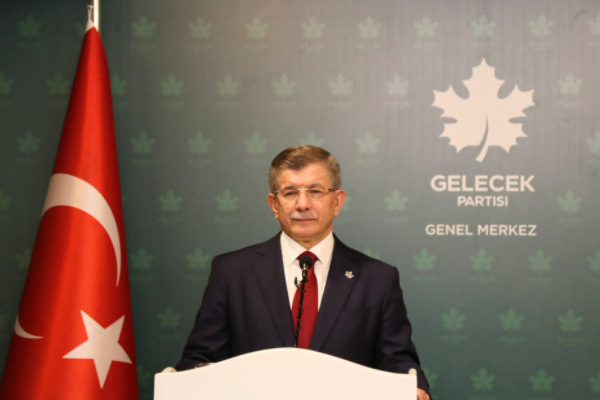The impossible trio: Exchange rate, interest, inflation / Haberin Peşinde Urfa
The FX Protected Time Deposit Account is a competitive time deposit product that provides FX protection in case the USD, EUR and GBP rates in TL increase more than the interest rate at the end of the term.
Things done on the currency side. Currency protected TL deposits. The FX Protected Time Deposit Account is a competitive time deposit product that provides FX protection in case the USD, EUR and GBP rates in TL increase more than the interest rate at the end of the term. This account can be opened by both real and legal persons. Legal entities residing in Turkey can also open a foreign currency protected deposit account with a maturity of 3, 6 and 12 months. With the decision published in the Official Gazette on March 7, 2022, legal entities were given the opportunity to open a foreign currency protected deposit account with a maturity of 3 months.
The Foreign Currency Protected Time TL Deposit Account provides returns with the interest rate it offers at account opening, and protects savings from possible exchange rate movements throughout the term. If the exchange rate movement in the maturity period exceeds the interest rate, the return it provides will be as much as the exchange rate change.
Currency Protected Deposits will continue until the end of 2023.
-Limitations
-Banks – credit
It is understood that such restriction measures are to prevent the use of the credit used for foreign exchange purchase.
According to the new requirement of the BRSA, companies whose foreign currency assets do not exceed 10 million TL in TL terms are required not to increase their foreign currency assets above 10 million TL in case of using loans. In addition, companies with foreign currency assets above 10 million TL will not be able to use new cash TL commercial loans if this asset exceeds 5% of their assets or sales revenues. If the foreign currency amount and rate requirement in July is lowered in October, this will mean that the restrictions will apply to more companies, and if enough companies do not convert their foreign currency into TL, it may lead to a decrease in credit utilization. Companies that have high foreign currency liabilities and hold foreign currency assets for prudential purposes are also expected to convert to currency-protected deposits.
The Central Bank increased the FX required reserve commission rate taken from banks from 3% to 8% if the Turkish lira deposit/participation fund ratio is below 50% of the total deposits. If the rate is 50-60%, the commission rate for banks will be 3%, and no commission will be taken from those with a rate above 60%. Banks have recently started to give high interest rates to TL deposits in order not to miss out on depositors. They can create special offers, rates, returns and higher deposit costs, possibly to avoid missing deposits and not subject to RR commission penalties.
-Foreign investor swap limits
In 2020, the BRSA reduced the Turkish banks’ limits on giving TL to foreigners and receiving dollars in return from 10% of equities to 1%. With the swap restriction, it was aimed to prevent foreign banks from buying dollars using TL obtained from swap transactions with Turkish banks. In the middle of 2022, this limitation was relaxed with the dedicated swap facility, subject to certain rules. Regarding swap lines, foreigners will be offered liquidity in local currency at the same rate as domestic investors, as long as the financing does not reach TL short sellers. Accordingly, under the program prepared by the Ministry of Treasury and Finance, offshore investors will have access to a new swap line with a maturity of at least 3 to 6 months to purchase assets in TL.
In March, the BRSA warned banks not to provide lira funds to companies that want to speculate in foreign markets against lira. The central bank also aimed to limit the supply of liquidity outside of Turkey by restricting domestic investors’ purchases of new lira bonds sold by international banks.
-Corporate
§ Sales of 40% foreign exchange to the CBRT
In January, Turkey made it mandatory for exporters to convert 25% of their foreign exchange income into lira at the Central Bank. In April, the rate at which exporters were required to convert their foreign exchange earnings to lira increased from 25% to 40%:
“Export and foreign exchange earning service fee, selling foreign currency to the Central Bank ARTICLE 4- (1) (Amendment: 18/4/2022) According to the Export Circular, at least 40% of the export value of the foreign currency tied to the IBKB or DAB is the share of IBKB or DAB. It is sold to the bank issuing the IBKB or DAB to be sold to the Central Bank at the transaction rate on the date of issue.”
The main purpose is to reinforce the Central Bank’s reserves over the foreign exchange income of exporters and to enable exporters to convert their foreign currency inputs into lira.
§ TL credit restriction
The upper limit for holding foreign currency cash assets as a credit utilization criterion for companies has been reduced from 15 million lira to 10 million lira. Companies are being directed to change their foreign currency deposit accounts and not to buy foreign currency, but to return to TL. In this arrangement, as it will not be possible for a company to meet the loan usage conditions if it “holds foreign currency in excess of need”, things become more difficult for companies that have excess foreign currency or have to make a little more transactions in foreign currency.
Companies will either sell or not demand foreign currency in order to obtain credit, as another possibility, they will reduce their tendency to use credit. Due to the fact that some banks have stopped or slowed down the use of commercial TL, there are some problems in the real sector’s access to credit despite the falling interest rates.

USDTRY and annual headline inflation rate comparison… Source: TurkStat, CBRT, Tera Yatirim
Potential limits. The CBRT cut the policy rate to 9% with another rate cut in November. MPC stated in its policy statement that “the current policy rate is sufficient and it has decided to end the rate cut cycle that started in August”. In addition, it is referred that the Central Bank may continue to take additional measures. As it is known, while the interest rates were reduced, restrictive measures were taken to ensure that the loans were transferred to the desired target areas in a way that would contribute to the economic activity. In order to support the liraization, measures such as collateral, security establishment and required reserve policies are taken. It seems that measures similar to the previous ones may continue to come. In this context, the Central Bank will determine the details of the upcoming period on the instruments intended to increase the efficiency of the monetary transmission mechanism in the text of the “2023 Monetary and Exchange Rate Policy” to be announced in December. In this period, when interest rates will be put on hold for a while, we expect alternative instruments to be active and fine-tuning to continue.
Growth effects. The growth policy at any cost has dealt a blow to the lira, which has lost 43% of its value against the dollar in one year. The lira has stabilized in recent months, after a series of interventions by the central bank and government policies.
President Recep Tayyip Erdoğan assesses that the extremely loose monetary policy should continue to revive the economy before the elections to be held next year. Erdogan, who describes himself as an “anti-interest rate”, believes that, contrary to mainstream economic theory, high rates feed inflation rather than slow it down.
Turkey’s growth perspective will probably continue until the 2023 elections, at which point generous economic policies will begin to strain both production and demand. For this strategy to be successful until the June elections, more foreign exchange resources will be needed. The amount and timing of these resources will play a key role in assessing the 2023 outlook for the Turkish economy and predicting the June election results.
Conclusion? Since monetary policy in the unconventional framework was adopted as the New Economic Model this time last year, the lira and inflation trend have worsened. As a result; low interest rates paved the way for foreign exchange demand. Various regulations have come and continue to come in order to prevent this foreign exchange demand. If no funds come from Russia or another country or investor, Turkey’s expansionary economic policies are likely to cause a new foreign exchange shock.
Kaynak: Tera Yatırım-Enver Erkan
Hibya Haber Ajansı











